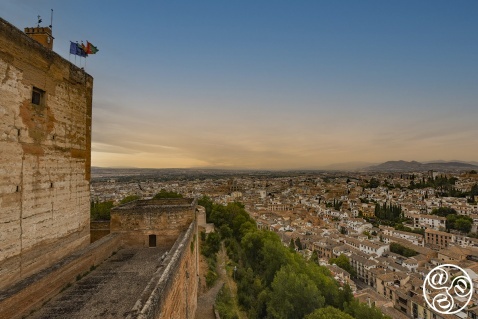
The pomegranate appears on Granada city's coat of arms |
|
History of Granada
Granada's history is one of internal crises because of the existence of a powerful landowning nobility successive wars with Castile. Successive kings of Granada sought political support and military aid from Morocco. Moroccan recruits caused the kingdom to undergo an intense process of "arabisation", to cut itself off from all Castilian influences, and to develop an absolute form of government based on military support.
The central government's economic resources depended mainly on the silk industry and on external trade; the latter flourished because of the fortunate position of the chief port, Málaga, on the route from the Mediterranean to the Atlantic. Granada paid close attention to the Strait of Gibraltar; for a whole century its rulers made efforts to secure control of the straits, allying to this end at different times with both Morocco and Castile.
In 1306 Muhammad III (ruled 1302-09), then in possession of Ceuta and Gibraltar, seemed to have succeeded, but a powerful coalition soon reduced him to the modest position of vassal of the king of Castile. After 1340, when the battle of Río Salado settled the question of the straits in Castile's favour, Granada adopted a policy of isolation, taking advantage of any propitious circumstance to strengthen its land frontiers. It was in this period that Yusuf I (ruled 1333-54) and Muhammad V (ruled 1354-59 and 1362-91) finished building the Alhambra.
The city's name may have been derived either from the Spanish granada, "pomegranate," a locally abundant fruit that appears on the city's coat of arms, or from its Moorish name, Karnattah (Gharnatah), possibly meaning "hill of strangers." Granada was the site of an Iberian settlement, Elibyrge, in the 5th century BC and of the Roman Illiberis. As the seat of the Moorish kingdom of Granada, it was the final stronghold of the Moors in Spain, falling to the Roman Catholic monarchs Ferdinand II and Isabella I in January 1492.
